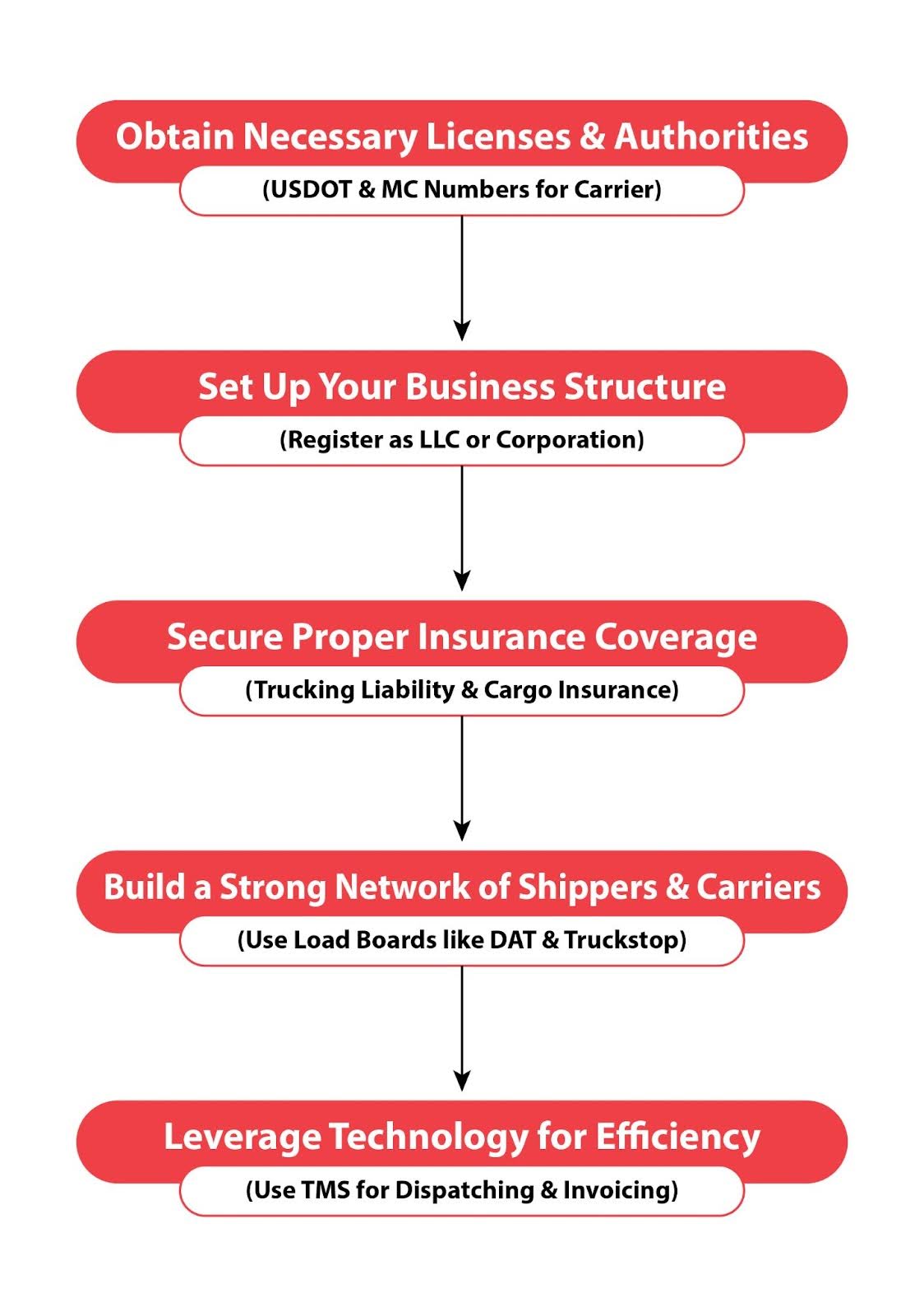
Can You Be a Carrier and a Freight Broker? Legalities, Benefits, & Steps
Many trucking business owners and entrepreneurs wonder if they can legally operate as both a carrier and a freight broker. They see the potential for increased revenue but are unsure about the legal requirements, risks, and complexities involved. The challenge is that while running both roles can be highly profitable, it also comes with strict FMCSA regulations, compliance hurdles, and operational complexities. Without a clear understanding of licensing, insurance, and ethical practices, businesses risk fines, penalties, or even losing their authority. Additionally, managing both roles can be overwhelming without the right systems, tools, and strategies in place.
This comprehensive guide will walk you through everything you need to know about being both a carrier and a freight broker, including legal considerations, benefits, challenges, step-by-step processes, and best practices. By the end, you’ll have the knowledge and confidence to successfully navigate this dual business model while staying compliant and maximizing profitability. If you’re wondering whether you can legally run both businesses and how to do it successfully, this guide provides everything you need to know.
Understanding the Roles
Before diving into whether you can operate as both a carrier and a freight broker, it’s essential to understand what each role entails.
What Is a Carrier?
A carrier is a company or an individual responsible for the physical transportation of goods from one location to another. Carriers own and operate trucks and work directly with shippers or brokers to fulfill deliveries.
Types of Carriers:
- Owner-Operators: Independent truck drivers who own and operate their trucks. They often contract with brokers or directly with shippers to transport goods.
- Fleet Owners: Companies that manage multiple trucks and drivers. They may work with brokers or run dedicated logistics services.
Key Responsibilities of a Carrier:
- Transporting goods safely and efficiently.
- Ensuring timely delivery and meeting customer expectations.
- Maintaining compliance with DOT and FMCSA regulations.
- Managing operational costs, including fuel, maintenance, and insurance.
What Is a Freight Broker?
A freight broker acts as an intermediary between shippers (businesses needing goods transported) and carriers (those providing transportation services). Unlike carriers, brokers do not own trucks or physically transport freight.
For a deeper dive into freight broker responsibilities, check out What Does a Freight Broker Do?
What Does a Freight Broker Do?
- Connects shippers with reliable carriers to move freight.
- Negotiates shipping rates between shippers and carriers.
- Handles logistics coordination, paperwork, and compliance.
- Ensures cost-effective and efficient transportation solutions.
Freight brokers play a critical role in supply chain management, ensuring goods reach their destination smoothly while providing cost-saving options for shippers.
Comparison Table: Carrier vs. Freight Broker
|
Carrier |
Freight Broker |
|
Physically transports goods using trucks. |
Acts as an intermediary between shippers and carriers |
|
Owns and operates trucks. |
Does not own trucks or transport freight directly |
|
Requires USDOT & MC Numbers |
Requires a Broker MC Number & a $75,000 surety bond |
|
Earns money from hauling loads |
Earns commission by arranging freight transport |
|
Needs trucking liability & cargo insurance |
Needs broker liability insurance |
|
Must follow FMCSA & DOT safety regulations |
Must comply with FMCSA broker transparency rules |
|
Profitable if fuel, maintenance, and load factors are managed well |
Profitable if a strong network of shippers and carriers is built |
Can You Legally Be Both a Carrier and a Freight Broker?
Is It Legal?
Yes, you can legally operate as both a carrier and a freight broker, but you must comply with strict regulations set by the Federal Motor Carrier Safety Administration (FMCSA). The FMCSA allows businesses to hold both carrier and broker authorities, provided they follow specific rules to prevent conflicts of interest
For a detailed comparison of freight brokers vs. freight agents, check our blog..
Legal Requirements & FMCSA Compliance
To operate legally as both a carrier and a freight broker, you must:
- Maintain Separate Business Operations:
- Carriers and brokers must keep distinct financial and operational records.
- Revenue, expenses, and contracts for each business must be managed independently.
- Carriers and brokers must keep distinct financial and operational records.
- Obtain Proper Licensing & Authorities:
- Carrier Authority (USDOT & MC Number) – Required for trucking companies transporting freight.
- Broker Authority (Broker MC Number) – Required for arranging freight transportation.
- Surety Bond ($75,000) – Mandatory for brokers to ensure financial responsibility.
- Carrier Authority (USDOT & MC Number) – Required for trucking companies transporting freight.
- Avoid Double Brokering Violations:
- Double brokering occurs when a broker reassigns a load to another broker or carrier without informing the shipper.
- It is illegal to broker a load and then move it as a carrier without proper disclosure.
- Double brokering occurs when a broker reassigns a load to another broker or carrier without informing the shipper.
- Ensure Compliance with FMCSA & DOT Regulations:
- Maintain valid insurance coverage for both trucking and brokering operations.
- Keep transparent records and follow all reporting requirements.
- Maintain valid insurance coverage for both trucking and brokering operations.
Benefits of Operating as Both a Carrier and a Freight Broker
1. Increased Revenue Potential
By operating as both a carrier and a broker, you can earn money from two sources:
- Hauling loads as a carrier.
- Brokering shipments to other carriers.
2. More Control Over Freight Operations
Instead of relying solely on brokers for shipments, you can choose when to:
- Move loads using your fleet.
- Brokers lower paying loads to other carriers.
3. Stronger Shipper Relationships
Shippers often prefer working with businesses that provide both trucking and brokerage services. According to Altline Sobanco, the synergy between freight brokers and carriers can significantly improve operational efficiency and profitability.
Challenges of Managing Both Roles
- Compliance & Legal Regulations – You must keep separate business records for brokerage and carrier operations to stay compliant.
- Increased Workload & Complexity – Handling dispatch, negotiations, compliance, and bookkeeping can be overwhelming without a solid system.
- Conflict of Interest & Double Brokering Risks – Double brokering (brokering a load and moving it yourself without disclosure) is illegal and can harm your reputation. Esteban Cebreros’s analysis emphasizes the importance of understanding legal complexities in dual operations to mitigate risks.
Step-by-Step Guide to Operating as Both a Carrier and a Freight Broker

Research suggests that leveraging technology like TMS can streamline operations and reduce workload.
Frequently Asked Questions
Is it legal to operate as both a carrier and a freight broker?
Yes, it is legal, but you must comply with FMCSA regulations and keep your carrier and brokerage operations separate.
Can a carrier act as a broker?
While it is uncommon, yes, a trucking company can broker loads if it possesses both FMSCA motor carrier and property brokerage authority. Trucking companies that possess both authorities are a one-stop shop for customers.
How much does it cost to become both a carrier and a broker?
Expect to invest at least $100,000+, including costs for trucks, licensing, insurance, and a $75,000 surety bond for brokerage.
What are the biggest risks of managing both roles?
The biggest risks include compliance violations, operational complexity, and double brokering issues, which can lead to legal penalties.
How can I avoid double brokering problems?
Always maintain full transparency, disclose your role in every transaction, and never broker a load that you plan to move yourself without proper disclosure.
Can I run both businesses under one company name?
It is not recommended. Keeping your carrier and brokerage operations as separate legal entities helps avoid liability issues and financial conflicts
Final Thoughts
Operating as both a carrier and a freight broker can be a highly profitable business model, offering greater revenue potential, flexibility, and control over freight operations. However, this dual role requires strict legal compliance, proper business structuring, and efficient management to avoid risks like double brokering, financial conflicts, and regulatory violations.



